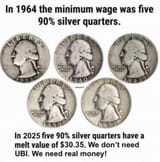>>508727271 (OP)
>If computers increased worker productivity why are workers now less able to buy a house?
Bunch of reasons.
1. Land is fixed supply, so investment in land doesn't follow the usual pattern of more investment => more efficient production => undercutting => lower prices for consumers. Investment in land just results in accumulation, which means a smaller share of the pie remaining for everyone else, which means higher prices for everyone else.
2. Foreigners can buy land without needing to even live in the country. In the 1950s there were very few ultra rich people, companies, governments etc outside of the anglo/euro world, but now there are thousands of billionaires and billion dollar companies in china, india etc. They are able to treat your land as a speculative asset, which amplifies the effect of (1). Even foreign GOVERNMENTS can buy up your land.
3. Work is now highly concentrated in cities, meaning 99% of the land is worthless for living on since it isn't in commute range of a job. If only 1% of the land is livable then that makes it easier for speculators to monopolize it and squeeze people dry.
4. If computers drastically increase productivity then employers are going to want to compensate the people/companies/etc making the computers rather than the workers using the computers, since it was the computers that are responsible for the increased productivity rather than the workers.
5. Mass migration tends to reduce the value of labor across the board. Even if it's mostly low-skilled jobs, there is a domino effect. Low skilled jobs being flooded by migrants forces the people being replaced to either work for less in the same jobs, or to pursue higher skilled jobs instead. When they choose the second path, this leads to degree inflation, competition for higher skilled jobs etc, which then reduces the value of labor there too. The previous low-skilled workers become to higher skilled jobs what the migrants were to the low skilled jobs.
 6/25/2025, 11:31:23 PM
No.508727271
[Report]
>>508727887
>>508728017
>>508728041
>>508728123
>>508728412
>>508728670
>>508729132
>>508729370
>>508729575
>>508729646
>>508729893
>>508730190
>>508730679
>>508730947
>>508730956
>>508731001
>>508731131
>>508731513
6/25/2025, 11:31:23 PM
No.508727271
[Report]
>>508727887
>>508728017
>>508728041
>>508728123
>>508728412
>>508728670
>>508729132
>>508729370
>>508729575
>>508729646
>>508729893
>>508730190
>>508730679
>>508730947
>>508730956
>>508731001
>>508731131
>>508731513





